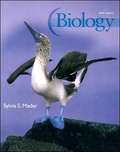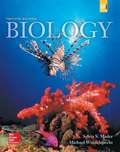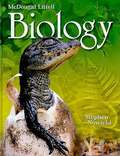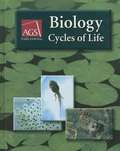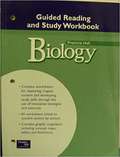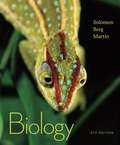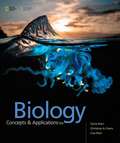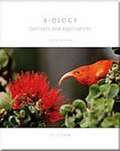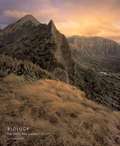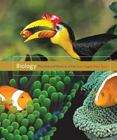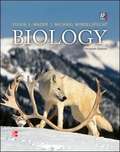- Table View
- List View
Biology
by Sylvia S. MaderBiologyis a comprehensive introductory biology textbook that covers biology in a traditional order, from the structure and function of the cell to the organization of the biosphere. The book centers on the evolution and diversity of organisms. It’s no wonder that Sylvia Mader’sBiologycontinues to be a text that’s appreciated as much by teachers as it is by the students who use it. The tenth edition is the epitome of Mader’s expertise: Its concise, precise writing uses an economy of words to present the material as succinctly and clearly as possible, thereby enabling students to understand the concepts without necessarily asking the teacher to explain further. AP Correlation Visit the Online Learning Center Request an Examination Copy
Biology: Student Study Guide (Ninth Edition)
by Sylvia S. MaderThe Study Guide is designed to accompany your text, Biology, ninth edition, by Sylvia S. Mader. A number of different approaches are used to help you achieve mastery of the chapter concepts.
Biology
by Sylvia S. Mader Michael WindelspechtTHE MADER/WINDELSPECHT STORY. . . The twelfth edition of Biology is a traditional, comprehensive introductory biology textbook, with coverage from Cell Structure and Function to the Conservation of Biodiversity. The book, which centers on the evolution and diversity of organisms, is appropriate for any one- or two-semester biology course. Biology, 12th Edition is the epitome of Sylvia Mader's expertise. Its concise, precise writing-style employs lucid language to present the material as succinctly as possible, enabling students--even non-majors--to master the foundational concepts before coming to class. "Before You Begin", "Following the Themes", and "Thematic Feature Readings" piece together the three major themes of the text--evolution, nature of science, and biological systems. Students are consistently engaged in these themes, revealing the interconnectedness of the major topics in biology. Sylvia Mader typifies an icon of science education. Her dedication to her students, coupled with her clear, concise writing-style has benefited the education of thousands of students over the past three decades. The integration of the text and digital world has been achieved with the addition of Dr. Michael Windelspecht's facility for the development of digital learning assets. For over ten years, Michael served as the Introductory Biology Coordinator at Appalachian State University--a program that enrolls over 4,500 non-science majors annually. Michael is the lead architect in the design of McGraw-Hill's Connect Plus and LearnSmart media content for the Mader series. These assets allow instructors to easily design interactive tutorial materials, enhance presentations in both online and traditional environments, and assess the learning objectives and outcomes of the course.
Biology
by Kenneth R. Miller Joseph S. LevineYou are about to enter a wonderfully exciting, and sometimes unbelievable, world--the world of living things. In the pages of this textbook you will come to understand the nature of life as we know it today. You will also gain an appreciation of the scientific process that has resulted in the body of knowledge we know as biology.
Biology
by Stephen Nowicki"The 21st century will be the century of biological science, just as the 20th century was the century of physical science," predicts Professor Stephen Nowicki, an award-winning teacher at Duke University. Dr. Nowicki has adapted his acclaimed introductory biology course for The Teaching Company to bring you up to date on one of the most important fields of knowledge of our time and help you appreciate the marvelous diversity and complexity of life. You will obtain the background and guidance to explore in depth the fundamental principles of how living things work-principles such as evolution by natural selection, the cellular structure of organisms, the DNA theory of inheritance, and much more. This challenging course is organized around three major themes: "Information and Evolution," "Development and Homeostasis," and "Energy and Resources. " You will explore living systems at all levels, from biological molecules to global ecosystems. You will gain insight into pressing issues facing society, including genetic modification and cloning, stem-cell research, AIDS, the depletion of the rainforests, and global warming. You will discover mechanisms behind such intriguing phenomena as why children resemble their parents, why plants bend toward light, how memories are stored, why some birds have very long tails, and how life itself began on Earth. Above all, you will learn how to think about biology, so that in your day-to-day life you will understand the significance and complexities of news stories, medical issues, and public debates, not to mention what is going on in your own garden and in nature all around you.
Biology
by Stephen Nowicki"The 21st century will be the century of biological science, just as the 20th century was the century of physical science," predicts Professor Stephen Nowicki, an award-winning teacher at Duke University. Dr. Nowicki has adapted his acclaimed introductory biology course for The Teaching Company to bring you up to date on one of the most important fields of knowledge of our time and help you appreciate the marvelous diversity and complexity of life. You will obtain the background and guidance to explore in depth the fundamental principles of how living things work-principles such as evolution by natural selection, the cellular structure of organisms, the DNA theory of inheritance, and much more. This challenging course is organized around three major themes: "Information and Evolution," "Development and Homeostasis," and "Energy and Resources." You will explore living systems at all levels, from biological molecules to global ecosystems. You will gain insight into pressing issues facing society, including genetic modification and cloning, stem-cell research, AIDS, the depletion of the rainforests, and global warming. You will discover mechanisms behind such intriguing phenomena as why children resemble their parents, why plants bend toward light, how memories are stored, why some birds have very long tails, and how life itself began on Earth. Above all, you will learn how to think about biology, so that in your day-to-day life you will understand the significance and complexities of news stories, medical issues, and public debates, not to mention what is going on in your own garden and in nature all around you.
Biology: Guided Reading and Study Workbook (Prentice Hall Biology, 2002)
by Prentice Hall Dictionary EditorsThese books provide a wide range of question formats, promotes and enhances study skills, and builds a record of student work to use as an aid for quizzes and tests.
Biology: Guided Study Workbook, Student Edition
by Prentice Hall Dictionary EditorsOne program that ensures success for all students
Biology: The Dynamic Science
by Peter J. Russell Paul E. Hertz Beverly McMillanNIMAC-sourced textbook
Biology
by Eldra P. Solomon Linda R. Berg Diana W. MartinStudying biology in today's fast-paced environment where new research is cropping up daily is exciting--and also a bit daunting, unless you have the right textbook to help you make sense of it all. Popular with students at colleges nationwide, Solomon, Berg, and Martin's BIOLOGY is often described as the best text available for learning biology. Filled with resources to guide your study, the Eighth Edition brings clarity to key concepts as it draws you into the excitement of new research in genetics, cell communication, evolution, and many other topics. The book's in-chapter Learning System is like a built-in study guide, focusing your attention on key learning objectives. Many of the text's colorful illustrations are correlated with animated figures online so you can interactively study and reinforce your understanding of complex processes.
Biology: Concepts And Applications
by Cecie Starr Christine A. Evers Lisa StarrNIMAC-sourced textbook
Biology: Concepts And Applications
by Cecie Starr Christine A. Evers Lisa StarrNIMAC-sourced textbook
Biology: Concepts and Applications
by Cecie Starr Christine A. Evers Lisa StarrBIOLOGY: CONCEPTS AND APPLICATIONS supplies an 800 page, introductory issues-oriented approach with enormous instructional power. Starr supports mastery throughout while encouraging the critical thinking students need as citizens, voters, parents, and consumers. The "Impacts, Issues" and "How Would You Vote?" features new to this edition make biology come alive. An "Impacts, Issues" case study opens each chapter focusing on a biology-related societal issue. Short films that expand on the issue are on the free Student CD. Each chapter's "How Would You Vote?" asks students to consider biology-related news, apply knowledge, cast a vote on the web and see state and nationwide voting tallies. The access codes that accompany all new copies provide online access to 1) BiologyNow, a learning tool that helps students assess their unique study needs through pretests, post-test and personalized learning plans; 2) InfoTrac, a library of full text articles; 3) vMentor, a live tutoring service and 4) "How Do I Prepare," a feature that allows students to review basic math, chemistry, and other skills that will help them more easily master introductory biology. And now with an MP3 download of this title, you don't have to lose prep time during a long commute'any MP3 player lets you or your students listen and review the text at the gym, in the library, at the office ? anywhere! Starr is the most successful author in non-majors biology because of her clear and engaging writing
Biology: The Unity and Diversity of Life
by Cecie Starr Ralph Taggart Christine A. Evers Lisa StarrThe 11th edition of this undergraduate text seeks to make students aware of the connection between molecular change, evolution, and students' own lives. To achieve this goal, the text features essays on current controversial issues, links to concepts within and between chapters, two-page concept spreads, and problem solving examples and experiments
Biology: The Unity and Diversity of Life
by Cecie Starr Ralph Taggart Christine Evers Lisa StarrThe 11th edition of this undergraduate text seeks to make students aware of the connection between molecular change, evolution, and students' own lives. To achieve this goal, the text features essays on current controversial issues, links to concepts within and between chapters, two-page concept spreads, and problem solving examples and experiments that encourage students to think critically. Other changes include reorganized and rewritten material on areas such as energy flow and stem cell research. Author information is not given. Annotation ©2006 Book News, Inc. , Portland, OR (booknews. com)
Biology (Alabama Edition)
by Stephen Nowicki"The 21st century will be the century of biological science, just as the 20th century was the century of physical science," predicts Professor Stephen Nowicki, an award-winning teacher at Duke University. Dr. Nowicki has adapted his acclaimed introductory biology course for The Teaching Company to bring you up to date on one of the most important fields of knowledge of our time and help you appreciate the marvelous diversity and complexity of life. You will obtain the background and guidance to explore in depth the fundamental principles of how living things work-principles such as evolution by natural selection, the cellular structure of organisms, the DNA theory of inheritance, and much more. This challenging course is organized around three major themes: "Information and Evolution," "Development and Homeostasis," and "Energy and Resources. " You will explore living systems at all levels, from biological molecules to global ecosystems. You will gain insight into pressing issues facing society, including genetic modification and cloning, stem-cell research, AIDS, the depletion of the rainforests, and global warming. You will discover mechanisms behind such intriguing phenomena as why children resemble their parents, why plants bend toward light, how memories are stored, why some birds have very long tails, and how life itself began on Earth. Above all, you will learn how to think about biology, so that in your day-to-day life you will understand the significance and complexities of news stories, medical issues, and public debates, not to mention what is going on in your own garden and in nature all around you.
Biology (AP Edition)
by Sylvia MaderThis comprehensive introductory textbook covers biology traditionally - from the structure and function of the cell to the organization of the biosphere. The new 11th AP Edition of Biology features integrated coverage of the new AP Biology Curriculum Framework with Part Openers that provide an overview of the Big Idea as it relates to the chapters within the Part. In addition, each chapter begins with a guide to Following the Big Ideas and concludes with a Connecting the Concepts with the Big Ideas section. The preface includes information on the AP Biology course, the AP Exam, and an AP Correlation, while a complete AP Practice Exam can be found in the back of the book. An icon of science education, Sylvia Mader's dedication to her students, coupled with a concise writing style, has benefited the education of thousands of students.
Biology (California)
by Stephen Nowicki"The 21st century will be the century of biological science, just as the 20th century was the century of physical science," predicts Professor Stephen Nowicki, an award-winning teacher at Duke University. Dr. Nowicki has adapted his acclaimed introductory biology course for The Teaching Company to bring you up to date on one of the most important fields of knowledge of our time and help you appreciate the marvelous diversity and complexity of life. You will obtain the background and guidance to explore in depth the fundamental principles of how living things work-principles such as evolution by natural selection, the cellular structure of organisms, the DNA theory of inheritance, and much more. This challenging course is organized around three major themes: "Information and Evolution," "Development and Homeostasis," and "Energy and Resources." You will explore living systems at all levels, from biological molecules to global ecosystems. You will gain insight into pressing issues facing society, including genetic modification and cloning, stem-cell research, AIDS, the depletion of the rainforests, and global warming. You will discover mechanisms behind such intriguing phenomena as why children resemble their parents, why plants bend toward light, how memories are stored, why some birds have very long tails, and how life itself began on Earth. Above all, you will learn how to think about biology, so that in your day-to-day life you will understand the significance and complexities of news stories, medical issues, and public debates, not to mention what is going on in your own garden and in nature all around you.

